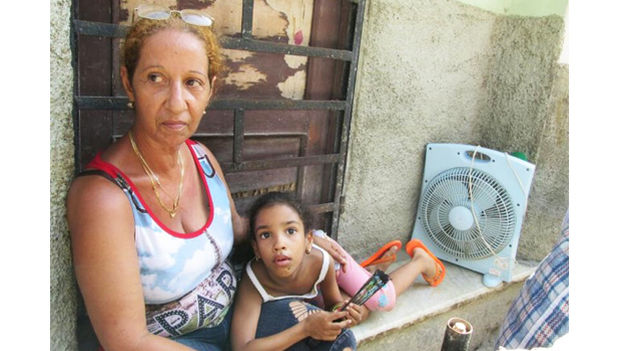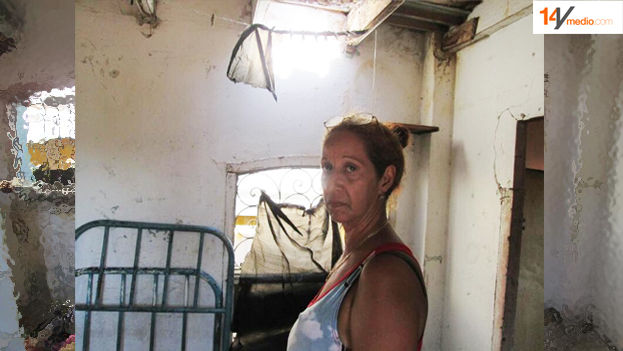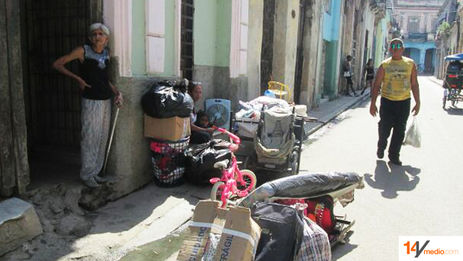
14ymedio, Yosmany Mayeta Larada, Havana, 4 September 2016 – After the heavy rains that have hit western Cuba in recent days, many residents of the capital fear an increase in the number of building collapses. Denise Rodriguez Cedeño, 54, a resident Luz Street, between Egido and Curacao, in Old Havana, placed her family’s belongings in the street after part of the roof of her house caved in on Saturday.
Those who pass through the busy street, in the heart of the historic center, can see the bundles with clothes piled up outside the building, along with kitchenware and a fan. The Rodriguez Cedeño family made the decision to spend their hours outdoors, in protest against the lack of response from the institutions charged with distributing materials for home repairs.
The already poor state of her home worsened with the storm that brought heavy rains, linked to the ninth tropical depression of the hurricane season, a weather phenomenon that caused intense rains in the west and center of the island and moderate flooding in the coastal town of Surgidero of Batabanó.
Rodriguez Cedeño works for Community Services and has lived in her home for more than 35 years. The resident told 14ymedio that her housing problems began in 2003, but she has not yet received a reply from anyone. Right now her situation is desperate.
“For 13 years I have been asking for repairs to my house, but but always tell me there are no building materials”
The anguish has led her to also pressure the authorities with the warning that she is not going to send her grandchildren to school this Monday, when the new school year begins nationwide, because she does not have the conditions to guarantee them a “home.”
“For thirteen years I have been asking through a technical report for repairs to my house, but they always tell me there are no building materials,” she says. On other occasions, Rodriguez Cedeño has chosen to “make repairs with my own resources,” but the deteriorating economic status of the family, made up of “four women and two little girls who have chronic asthma,” has prevented her from being able to make the arrangements to do it herself.

After several hours in which the women stayed with their belongings in the open street, the authorities of the Council of the Municipal Administration (CAM) of Old Havana arrived, to learn what damage occurred in the house and to call for calm. Dozens of people, especially foreigners passing through the city, were filming what was happening.
The directors of CAM explained that the family would be located in a Transit Community (a shelter) for about seven days and then taken to inhabitable housing in another community for people whose homes have been declared uninhabitable or have collapsed.
Rodriguez Cedeño had spent the whole night between the street and the half-ruined house, waiting for the authorities keep their word this Sunday. She warned that they would “plant themselves in the street again” if they didn’t provide a permanent solution to her case.
These residents of the Old Havana have become part of the 33,889 families across the country who need a home
In their current situation, these residents of the Old Havana neighborhood have become part of the 33,889 families (132,699 people) across the country who need a home, many of whom have spent decades living in shelters for victims. The population census of 2012 showed that 60% of the 3.9 million existing housing units on the island are in poor condition.
During the last session of the National Assembly of People’s Power, in July, the deputies met in the Standing Committee on Industry, Construction and Energy, and agreed that “the housing problem is the number one social need in Cuba.” The parliamentarians criticized “lack of coordination, integration and priority” at the municipal level in managing the demands of the population in terms of applications for materials and construction permits.
In the first half of this year, at least 90,652 people who have received subsidies for construction work have gone to the stores selling materials. However, only 52,000 have been able to buy all of the materials they were assigned, due to shortages of key products such as steel, cement blocks, bathroom fixtures, tiles and roofing.

